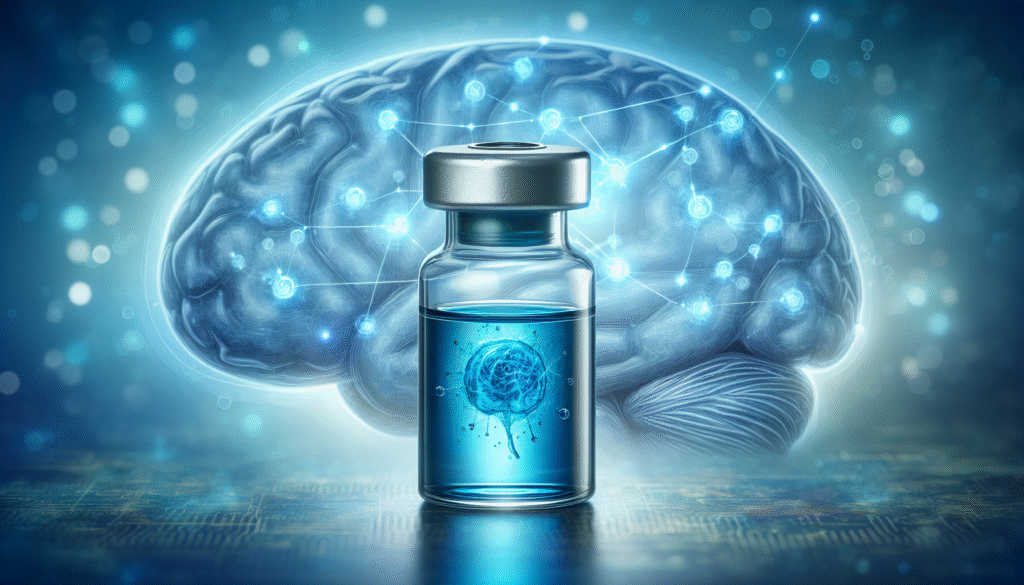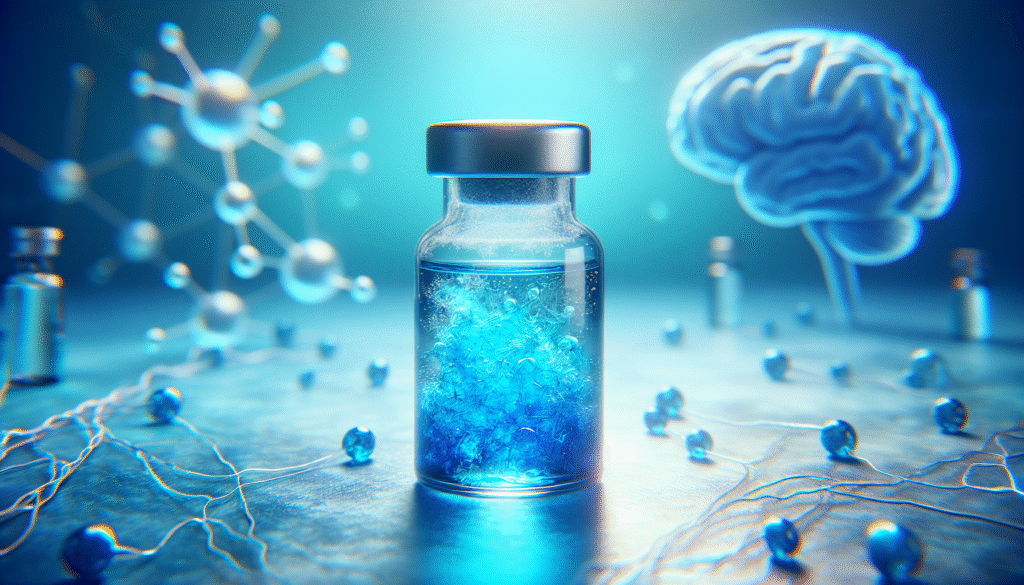
Have you ever wondered how specific compounds can influence the complex systems that govern your brain’s metabolism and energy levels? Understanding this can provide insight into how you might enhance cognitive function and overall well-being. Methylene Blue (MB), historically used as an industrial dye and later as a medication, is emerging from the shadows into the limelight of neurobiology. Its multifaceted effects on brain metabolism warrant a closer examination.

What Is Methylene Blue?
Methylene Blue is a synthetic compound with a rich history in medicine and biology. Originally developed as a dye in the 19th century, it has been used for various medical purposes, including treating methemoglobinemia and as a pH indicator.
Chemical Structure and Properties
From a chemical standpoint, Methylene Blue is an organic compound with the formula C16H18ClN3S. Its molecular structure is significant because it allows the compound to engage with various biological systems.
Methylene Blue’s properties make it a facilitator of electron transfer, which plays a crucial role in biological processes. It is solubilized in water, giving it the potential for widespread use in aqueous environments like the human body.
The Mechanism of Action
Understanding the mechanisms by which Methylene Blue affects brain metabolism can help clarify its potential health benefits.
Mitochondrial Function
Mitochondria, often dubbed the powerhouses of the cell, are essential for energy production. Methylene Blue enhances mitochondrial respiration by serving as an electron carrier in the mitochondrial respiratory chain. In simpler terms, this means that Methylene Blue helps mitochondria produce energy more efficiently, which is critical for cognitive function.
Reactive Oxygen Species
While energy production is critical, the byproducts of this process—reactive oxygen species (ROS)—can be damaging in excessive amounts. Methylene Blue may have antioxidant properties, neutralizing ROS and thereby protecting neurons from oxidative stress. This dual role underscores its potential as a neuroprotective agent.
Effects on Brain Metabolism
The influence of Methylene Blue on brain metabolism is profound and multifaceted. As you consider its applications, it’s crucial to grasp how it interacts with various metabolic pathways.
Glucose Metabolism
Methylene Blue has been shown to facilitate glucose metabolism, a primary energy source for the brain. By enhancing glycolysis and improving the efficiency of glucose utilization, Methylene Blue can potentially improve cognitive performance during tasks requiring sustained focus.
Neurotransmitter Systems
Your brain functions through a complex web of neurotransmitters that dictate mood, cognition, and overall brain health. Methylene Blue is believed to modulate several neurotransmitter systems, including:
- Serotonin: Enhances mood regulation and emotional well-being.
- Dopamine: Boosts motivation and reward pathways.
- Acetylcholine: Involved in learning and memory processes.
By interacting with these systems, Methylene Blue can impact how you feel and think, pervading areas ranging from mood enhancement to memory support.
Energy Production
At its core, Methylene Blue catalyzes energy production through its influence on mitochondrial function. Enhancing adenosine triphosphate (ATP) production means that your brain can perform optimally. This energy boost can be critical during mentally demanding tasks, potentially improving performance and reducing fatigue.
Benefits Beyond Energy Levels
While its role in boosting energy is significant, Methylene Blue offers additional benefits that might resonate with various individual needs.
Cognitive Enhancement
If you’re in search of ways to sharpen your focus or improve your cognitive abilities, Methylene Blue may play a beneficial role. Research suggests it can enhance memory and learning, making it a subject of interest for those in academic or high-demand professional settings.
Neuroprotection
The protective properties of Methylene Blue extend beyond energy enhancement. By protecting neurons from oxidative damage and apoptosis (programmed cell death), it may play a role in mitigating neurodegenerative diseases.
Mood Regulation
Your emotional health is just as important as cognitive performance. Methylene Blue’s influence on neurotransmitter systems suggests a potential antidepressant effect. By regulating serotonin levels and enhancing mood, it may help those experiencing depressive symptoms.

Clinical Research and Findings
Recent studies investigating the effects of Methylene Blue have yielded a wealth of data that underscores its potential benefits.
Key Studies
-
Cognitive Function in Older Adults: A study published in a reputable journal demonstrated that Methylene Blue could enhance memory and cognitive function in individuals over the age of 60, suggesting its implications for age-related cognitive decline.
-
NeurodegenerativeDisease Prevention: Animal studies have shown promising results in using Methylene Blue to slow the progression of neurodegenerative diseases, such as Alzheimer’s and Parkinson’s.
-
Mood Enhancement: Clinical trials have indicated that Methylene Blue could serve as an adjunct treatment for depression, particularly in treatment-resistant cases.
Mechanistic Insights
The underlying mechanisms documented in these studies reaffirm Methylene Blue’s impact on mitochondrial function, neurotransmission, and neuroprotection.
Dosage and Administration
Understanding the appropriate dosage and form of Methylene Blue is essential for anyone considering its use.
Recommended Dosage
While dosages can vary, research often points to a range of 0.5 to 4 mg/kg body weight when administered acutely. Always consult with a healthcare professional before starting any new supplement.
Forms of Methylene Blue
Methylene Blue is available in various forms, including:
- Liquid Form: Commonly used in clinical settings.
- Capsules/Tablets: More convenient for everyday use but may vary in bioavailability.
- Intravenous Administration: Employed in acute medical situations, usually under professional supervision.

Potential Side Effects and Risks
While Methylene Blue is generally considered safe for most people, it is essential to be aware of potential side effects.
Common Side Effects
Some individuals may experience:
- Nausea: Gastrointestinal discomfort can occur with higher doses.
- Dizziness: Particularly at higher concentrations that may influence blood pressure.
Contraindications
Methylene Blue can interact with certain medications, especially monoamine oxidase inhibitors (MAOIs), leading to potentially dangerous hypertensive crises. Always consult a healthcare provider if you are on medication.
The Future of Methylene Blue in Neurobiology
Current research indicates a growing interest in Methylene Blue’s applications beyond traditional medicine.
Innovation in Treatment Protocols
As understanding of Methylene Blue’s mechanisms deepens, the potential for innovative treatment protocols in ischemic conditions, cognitive decline, and mood disorders may expand.
Personalization of Treatment
With advancements in pharmacogenetics, personalized medicine is becoming a reality. Understanding how your individual genetic make-up influences your response to Methylene Blue could lead to more tailored therapies promising higher effectiveness and safety.

Conclusion
Methylene Blue exhibits a fascinating interplay of effects on brain metabolism and energy levels that can potentially enhance cognitive function, support neuroprotection, and regulate mood. As you consider incorporating Methylene Blue into your health regimen, ensure that you approach it with a well-informed perspective. Consulting healthcare professionals is advisable to tailor an approach that considers your unique health needs and circumstances. This compound holds promise; embracing this potential might be a transformative step in optimizing brain health and overall well-being.